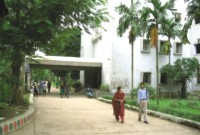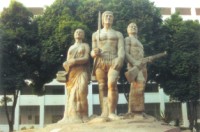|
Special
Feature
The
Best Years of Our Lives . . . Wasted?
Kajalie
Shehreen Islam
Everything
in our country is highly politicised, and caught in the divides
of our unhealthy politics are our educational institutions.
Indeed, they are one of the worst affected, with general students
caught in the vicious cycle of a seemingly unending, unrewarding
academic career.
"I'm
supposed to be giving my fourth (final) year exams this year,"
says Sonia Howlader Moni, a student of the Department of Mass
Communication and Journalism at the University of Dhaka. "Instead,
I'm giving my third year exams -- that too, I don't know when."
Besides
the numerous countrywide hartals ever so often, public universities
in general and Dhaka University in particular, go through
their own bouts of closures. An indefinite strike was called
by the JCD (Jatiyotabadi Chhatra Dal, BNP's student wing)
preceding the national elections of 2001 and another called
by BCL (Bangladesh Chhatra League, the Awami League's student
wing) over the Shamsunnahar Hall attack in 2002 lasted around
two months each. An almost month-long teacher's strike protesting
the attack on Bangla Department Professor Humayun Azad was
observed in March of this year. Last week saw the end of another
indefinite strike called by the BCL protesting the assassination
attempt on Leader of the Opposition and AL President Sheikh
Hasina last month is being enforced. Of the four, only the
strike related to the Shamsunnahar Hall incident and the attack
on Prof Azad had anything to do with the students of the university.
"Students
should not be involved in national politics," says Syeda
Zohora Shammi, a third year student of Dhaka University. "They
can fight for their rights as students, but not over the disputes
of the mainstream parties."
 Granted,
the country is in a crisis situation and we are all affected
by the political turmoil and increasing intolerance and extremism
on all fronts. But what good can come of stopping the studies
of the students? How does barring them from attending classes
and giving exams, and forcing them to participate reluctantly
in political processions, contribute to solving the multi-faceted
problems of our ailing nation? One would think that it would
be by educating our future generations that we would have
some hope of better leadership, a more stable polity and over-all
growth of the nation. But who are we to decide? Granted,
the country is in a crisis situation and we are all affected
by the political turmoil and increasing intolerance and extremism
on all fronts. But what good can come of stopping the studies
of the students? How does barring them from attending classes
and giving exams, and forcing them to participate reluctantly
in political processions, contribute to solving the multi-faceted
problems of our ailing nation? One would think that it would
be by educating our future generations that we would have
some hope of better leadership, a more stable polity and over-all
growth of the nation. But who are we to decide?
"We
are at the mercy of the party-backed student organisations,"
says Shammi. "What is the value, then, of our own merit
that has enabled us to be students of this prestigious institution?"
Which
brings us to the other point of who really are the leaders
of student groups in Bangladesh. There is doubt over whether
many of them even qualify as students, in terms of their age,
academic and marital status. Hardly any have the welfare of
students in mind.
In our
country, student parties do not fight for student rights but
for those of the mainstream parties by which they are backed.
When the
issues are student-related, the students themselves come forward
to fight for their rights. And when a real movement is needed
for the people of the nation, the general students have always
played a major role as we have seen many times -- during the
language movement of 1952, the independence movement of 1971
and the mass uprising against an autocratic government in
1990. But when the issues are selfish and biased, the self-centred,
partisan groups impose strikes that do nothing but ruin the
academic career of the general students -- of those who actually
want to learn.
 Months
of disrupted classes and waiting to take exams that have been
postponed at least twice and may or may not actually take
place that year makes it highly frustrating. Not only do students
become bored throughout the year during all the closures,
but they tend to lose interest in their studies and the spirit
to want to do well. Their minds become diverted towards other
things, including part-time jobs, which later make it difficult
to focus on studies at all. Months
of disrupted classes and waiting to take exams that have been
postponed at least twice and may or may not actually take
place that year makes it highly frustrating. Not only do students
become bored throughout the year during all the closures,
but they tend to lose interest in their studies and the spirit
to want to do well. Their minds become diverted towards other
things, including part-time jobs, which later make it difficult
to focus on studies at all.
Not every
student has the opportunity to work part-time, however. Many
need to finish their studies as soon as possible in order
to financially support parents and family once they start
working. For them, each month, not to mention each year lost,
counts.
"It's
worse for girls," says Sonia. "Men can take their
time settling down, but women have to start long before. Not
only do our parents become impatient with our never-ending
studies and begin to pressurise us to get married, but we
have to plan out our own lives as well. Building a career,
a family -- nothing is easy once you're a woman past 30, especially
in our society. As you grow older, your options decrease."
Students
of the same age at private universities graduate earlier than
those in public ones, she adds, enabling them to avail themselves
of the better jobs ahead of those graduating later who may
be just as qualified and deserving, if not more.
Age limits
set for employment opportunities also restrict many students
from applying for jobs which they could have qualified for
had they not taken seven years to graduate instead of four.
It is
almost as frustrating for parents who do not know when their
sons or daughters will graduate and what awaits them in an
uncertain future.
 Most
private universities are also usually more secure than public
ones because of student politics. While noisy political meetings
and processions have become an almost daily routine for frustrated
teachers and students straining to be heard above the ruckus,
many students of Dhaka University, Jahangirnagar University,
and other public universities in different districts have
witnessed violence on campus ranging from student cadres chasing
each other out of class buildings and dormitories to police
tear-gassing students and even gunfights. Most
private universities are also usually more secure than public
ones because of student politics. While noisy political meetings
and processions have become an almost daily routine for frustrated
teachers and students straining to be heard above the ruckus,
many students of Dhaka University, Jahangirnagar University,
and other public universities in different districts have
witnessed violence on campus ranging from student cadres chasing
each other out of class buildings and dormitories to police
tear-gassing students and even gunfights.
Violence,
or the fear thereof, on campus, is not restricted to students
or so-called students, however. Early this week, "patriots"
sent an e-mail to the Chair of the Mass Communication and
Journalism Department, threatening to blow up the Arts Building
of Dhaka University. According to a Daily Star report,
the "patriots" -- who refuse to be labelled "terrorists"
-- claim to be doing it "for a better life, a better
country and an Islamic country" for the "future
generation".
Public
universities, especially Dhaka University, is a centre of
all the country's hub. It is like a mini-capital in which
everything, both good and bad, takes place. But, judging from
the current situation, the meritorious talent and potential
which are supposed to be growing within its boundaries seem
to be overshadowed by the mini-versions of the different political
parties and their various, selfish issues imposed on campuses.
When will these institutions become the centre from which
our future generations will radiate the positive thinking
and growth towards the rest of the nation?
Copyright
(R) thedailystar.net 2004
| 